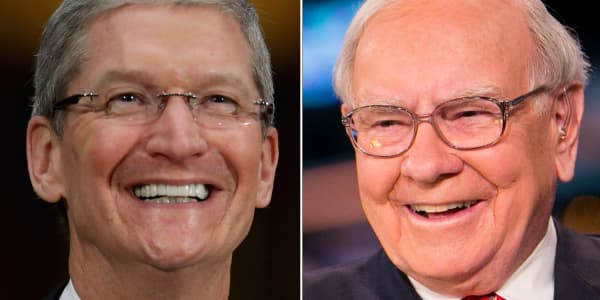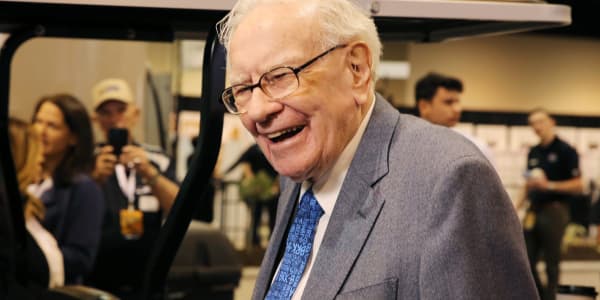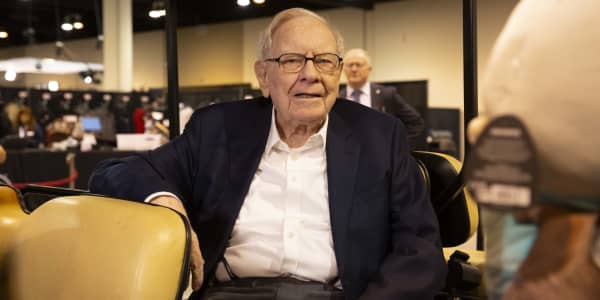In his annual letter to Berkshire Hathaway shareholdersreleased this morning, Warren Buffett says more "major" acquisitions are needed to maintain growth in the company's non-insurance businesses at a "decent rate."
Buffett writes: "We will need both good performance from our current businesses and more major acquisitions. We're prepared. Our elephant gun has been reloaded, and my trigger finger is itchy."
At the end of 2010, Berkshire had a lot of ammunition for that elephant gun: $38 billion in cash.
In the letter, Buffett also updates the derivatives contracts written by Berkshire that have caused concern among some investors.
He compares them to selling insurance, as Berkshire gets "premiums for assuming risk that others wish to shed" with no counterparty risk.
One category involves mostly 5-year contracts written between 2004 and 2008 that guaranteed against bond defaults by companies "included in certain high-yield indicies." Premiums totaled $3.4 billion for that 'insurance,' while the financial crisis required Berkshire to pay out $2.5 billion. That gave Berkshire "the use of an interest free float that averaged $2 billion over the life of the contracts." Buffett also reports that "our exposure is largely behind us because most of our higher-risk contracts have expired."
As a result, "It appears almost certain that we will earn an underwriting profit as we originally intended."
Berkshire has also written contracts protecting the buyers from long-term losses in several global equity indexes. Buffett says that late last year, at the request of the buyer, eight contracts were unwound, with a net gain for Berkshire of $222 million.
That left 39 equity put options remaining at the end of 2010, for which Berkshire received $4.2 billion in premiums, another source of money to help fuel acquisitions.
BNSF PURCHASE
Buffett says the "highlight" of 2010 was Berkshire's acquisition of the Burlington Northern Santa Fe railroad, "a purchase that's working out even better than I expected."
He's expecting that owning the railroad will increase Berkshire's "normal" earnings power by almost 40 percent pre-tax and "well over" 30 percent after-tax. He also writes that Berkshire "quickly replenished" the $22 billion in cash used to buy BNSF, so "the economics of this transaction have turned out very well."
LAGGING THE S&P
For the year, however, Berkshire's corporate performance lagged behind the S&P 500, as measured by per-share book value, a metric that Buffett calls an "understated proxy" for intrinsic value, which is hard to pin down.
Berkshire's per-share book value increased by 13.0 percent last year, 2.1 percent points behind the S&P's 15.1 percent gain, including dividends.
Berkshire's compounded annual gain from 1965 through 2010 of 20.2 percent is more than double the S&P's 9.4 percent advance. (Buffett started running things at Berkshire in 1965.)
'MEANINGLESS' NET INCOME
In the fourth quarter of 2010, Berkshire's net income increased by 43 percent. Buffett calls that measurement "almost always meaningless" at Berkshire, because it includes realized gains or losses from investments while excluding unrealized gains and "in most cases" losses, a situation that opens the door to "game playing" with numbers, a practice for which he has "deep disgust."
Buffett takes a few paragraphs to criticize the Black-Scholes formula, the "accepted standard" for valuing derivatives, saying it "produces wildly inappropriate values when applied to long-dated options."
Regulators and auditors like it, Buffett writes, in part because the formula generates a precise number. Buffett and Munger, on the other hand, think that's impossible. "We believe the true liability of our contracts to be far lower than that calculated by Black-Scholes, but we can't come up with an exact figure... We would rather be approximately right than precisely wrong."
Instead of learning how to value options, he argues, financial students should be learning how to value a business. "That's what investing is all about."
ECONOMIC OUTLOOK
For 2011, Buffett says he and partner Charlie Munger expect "a general business climate better than that of 2010 but weaker than that of 2005 and 2006."
He writes that a "housing recovery will probably begin within a year or so. In any event, it is certain to occur at some point."
Buffett also expects higher interest rates for the company's $38 billion in cash that has been earning a "pittance." "At some point, however, better rates will return" and add at least $500 million, "perhaps much more," to Berkshire's investment income, although that "sort of increase in money-market yields is unlikely to come soon."
Another boost will come when dividends on Berkshire's stock holdings "almost certainly increase" with the largest gain coming from Wells Fargo , where payouts have been kept artifically low by the Federal Reserve move to freeze dividends at major banks, regardless of the financial condition of each individual bank.
"At some point, probably soon, the Fed's restrictions will cease. Wells Fargo can then reinstate the rational dividend policy that its owners deserve."
Increased dividends from Wells, Coca-Cola , and other Berkshire holdings will help offset its reduction in investment income when General Electric and Goldman Sachs shut off the flow of dividends, probably by the end of the year, on the billions of dollars they borrowedfrom Berkshire at the height of the economic crisis.
TIMELESS ADVICE FROM BUFFETT'S GRANDFATHER
Near the end of his 26-page letter, Buffett expands on one of his common themes, the need to have a substantial cash cushion so that you're not at the mercy of lenders:
Unquestionably, some people have become very rich through the use of borrowed money. However, that’s also been a way to get very poor. When leverage works, it magnifies your gains. Your spouse thinks you’re clever, and your neighbors get envious. But leverage is addictive. Once having profited from its wonders, very few people retreat to more conservative practices. And as we all learned in third grade – and some relearned in 2008 – any series of positive numbers, however impressive the numbers may be, evaporates when multiplied by a single zero. History tells us that leverage all too often produces zeroes, even when it is employed by very smart people.
Buffett includes a typewritten letter written in 1939 by his grandfather Ernest to his son Fred, Warren's uncle. "Ernest never went to business school - he never in fact finished high school - but he understood the importance of liquidity as a condition for assured survival."
In the letter, Ernest tells Fred and his wife that "everyone should have a reserve" so he had created a fund by placing $200 in an envelope when they were married ten years before. With additional contributions, the envelope's contents had grown to $1000.
Ernest recommended they put the envelope in a safety deposit box in case they need some "ready cash" on short notice. "I would suggest that you use as little as possible, and replace it as soon as possible."
Why keep the reserve as cash in an envelope? Ernest writes:
You might feel that this should be invested and bring you an income. Forget it — the mental satisfaction of having $1000.00 laid away where you can put your hands on it, is worth more than what interest it might bring, especially if you have an investment in something that you could not realize on quickly.
Ernest ends the letter to his son with this FYI:
I might mention that there has never been a Buffett who ever left a very large estate, but there has never been one that did not leave something. They never spent all they made, but always saved part of what they made, and it has all worked out pretty well.
Current Berkshire stock prices:
Class B:
Class A:
For more Buffett Watch updates .
Email comments to buffettwatch@cnbc.com





